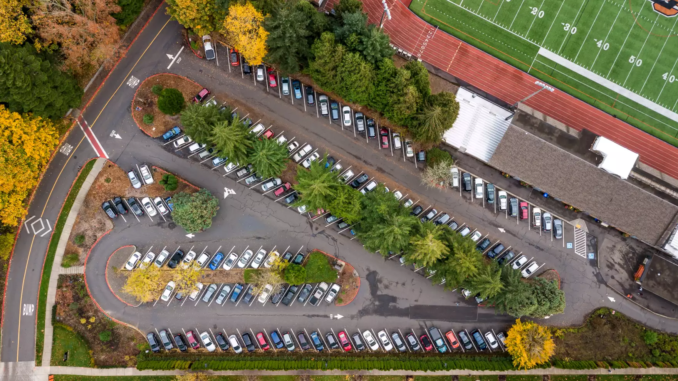
The Department of Transportation & Parking is citing more vehicles for parking violations than any year in the recent past.
Although many students, staff and faculty are frustrated with parking availability, Lewis & Clark still wishes to maintain access to multiple forms of transportation that are more eco-friendly. Gabriel Montez, the transportation and parking service manager at LC, manages all of the parking and shuttle services, such as the Pioneer Express, TriMet transit, hop cards and transport schedules.
In 2021, LC distributed the most parking citations since 2018, approximately 3,900 citations, nearly double the amount they gave in the 2019-20 school year according to department statistics. Of those tickets, 77 citations came from cars parked in fire lanes, 144 from parking in reserved visitor spots and 44 in disability accessible spots.
The deal LC has with St. Marks church that allows students to park in their lot has been extended until Dec. 15, and provides 50 additional spaces. There are also around 80 overflow parking spots on the graduate campus that are available during the day. According to Montez, only a fraction of the graduate campus spaces were full during school hours. Overflow parking can be accessed through Gate 8 on Palatine Hill Rd.
“I’ve definitely struggled finding parking here,” Isaac Simon ’25 said. “I wasn’t even aware that there are more spaces available to students this year.”
Maureen Gilbert, the lead dispatcher of Campus Safety, is in constant communication with the campus safety officers who update her on the occupancy of parking spaces every hour. Students can contact campus safety if they are struggling to find available parking.
“I have a morning officer letting me know which spaces are available,” Gilbert said. “I think it would be very helpful for students to have someone to talk to, to have an adult be like ‘you can park over there.’”
Students who park in fire lanes anywhere on campus will receive a $75 parking citation.
“My fear is one of these times they are going to be driving down one of these firelanes and now be able to get through, so if there was a medical or fire emergency we can’t get to you.” Gilbert said.
Students may be unsure of what the college does with the fines they collect from parking citations; these funds are directed towards the Pio and access to the TriMet system.
“We’re taxing individuals to drive and putting it towards an initiative that we think is better for the overall community and environment, but the narrative that the college is trying to steal money from students is completely false,” Montez said.
Montez is disappointed that the shuttle options are often used just for leisure, when they could be used for commuting.
“We put a lot of work into where we stop,” Montez said. “We put a lot of work into the schedule and make sure that it’s consistent. And we’ve put a lot of work into modifying it, such as adding the Sellwood route.”
According to Montez, the college is trying to be the most environmentally conscious it can be while still allowing many students to park on campus.
“We pride ourselves on being a sustainable college,” Montez said. “We pride ourselves on having stated sustainability goals, but I don’t feel as if the appetite is there for a lot of folks.”
The backlash received by the Department of Transportation & Parking has been aggressive, with verbally explicit notes left for Campus Safety. Montez said he feels a lot of entitlement within the student body when it comes to their cars.
“A big part of my job is balancing the expectations of students and faculty and overall LC community with also being empathetic and actually trying to provide tangible solutions for folks to get to and from campus,” Montez said. “Just because you have a vehicle, does not mean you’re entitled to parking. It’s just not the way the world works and so, again, it’s a difficult balance.”
Montez has always had positive experiences speaking directly to students and has found that when challenged, students often respond respectfully and in a productive way. Gilbert agrees.
“I think the students are the biggest solution to be honest with you,” Gilbert said. “I think students really have a good way with words, they read the Bark, they read whatever and that’s a good source of information coming from students, for students.”
Subscribe to the Mossy Log Newsletter
Stay up to date with the goings-on at Lewis & Clark! Get the top stories or your favorite section delivered to your inbox whenever we release a new issue.

Leave a Reply